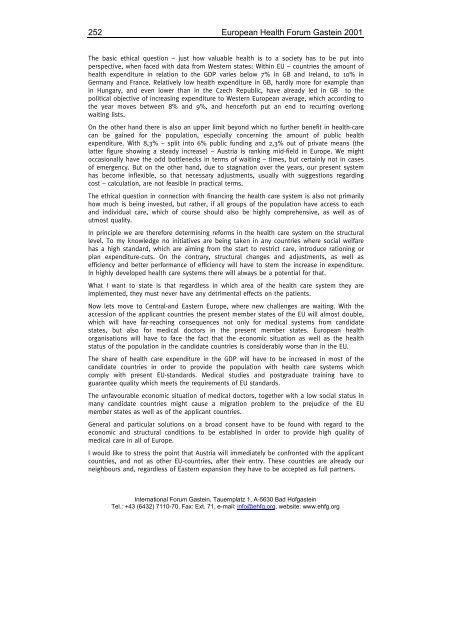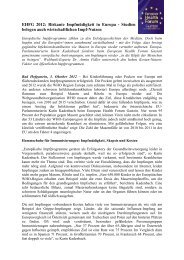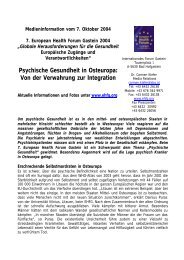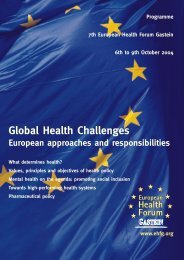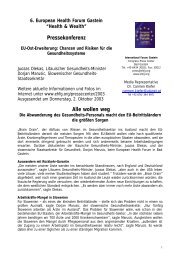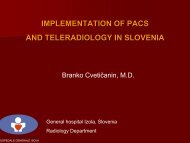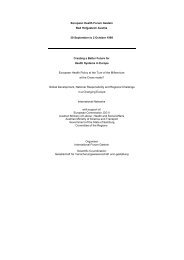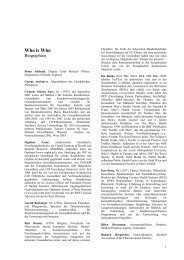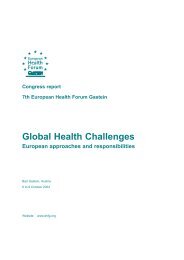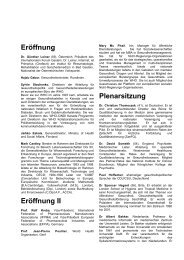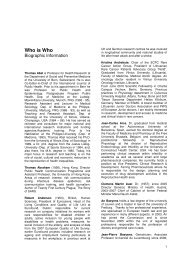Congress report - European Health Forum Gastein
Congress report - European Health Forum Gastein
Congress report - European Health Forum Gastein
Create successful ePaper yourself
Turn your PDF publications into a flip-book with our unique Google optimized e-Paper software.
252<br />
<strong>European</strong> <strong>Health</strong> <strong>Forum</strong> <strong>Gastein</strong> 2001<br />
The basic ethical question – just how valuable health is to a society has to be put into<br />
perspective, when faced with data from Western states: Within EU – countries the amount of<br />
health expenditure in relation to the GDP varies below 7% in GB and Ireland, to 10% in<br />
Germany and France. Relatively low health expenditure in GB, hardly more for example than<br />
in Hungary, and even lower than in the Czech Republic, have already led in GB to the<br />
political objective of increasing expenditure to Western <strong>European</strong> average, which according to<br />
the year moves between 8% and 9%, and henceforth put an end to recurring overlong<br />
waiting lists.<br />
On the other hand there is also an upper limit beyond which no further benefit in health-care<br />
can be gained for the population, especially concerning the amount of public health<br />
expenditure. With 8,3% – split into 6% public funding and 2,3% out of private means (the<br />
latter figure showing a steady increase) – Austria is ranking mid-field in Europe. We might<br />
occasionally have the odd bottlenecks in terms of waiting – times, but certainly not in cases<br />
of emergency. But on the other hand, due to stagnation over the years, our present system<br />
has become inflexible, so that necessary adjustments, usually with suggestions regarding<br />
cost – calculation, are not feasible in practical terms.<br />
The ethical question in connection with financing the health care system is also not primarily<br />
how much is being invested, but rather, if all groups of the population have access to each<br />
and individual care, which of course should also be highly comprehensive, as well as of<br />
utmost quality.<br />
In principle we are therefore determining reforms in the health care system on the structural<br />
level. To my knowledge no initiatives are being taken in any countries where social welfare<br />
has a high standard, which are aiming from the start to restrict care, introduce rationing or<br />
plan expenditure-cuts. On the contrary, structural changes and adjustments, as well as<br />
efficiency and better performance of efficiency will have to stem the increase in expenditure.<br />
In highly developed health care systems there will always be a potential for that.<br />
What I want to state is that regardless in which area of the health care system they are<br />
implemented, they must never have any detrimental effects on the patients.<br />
Now lets move to Central-and Eastern Europe, where new challenges are waiting. With the<br />
accession of the applicant countries the present member states of the EU will almost double,<br />
which will have far-reaching consequences not only for medical systems from candidate<br />
states, but also for medical doctors in the present member states. <strong>European</strong> health<br />
organisations will have to face the fact that the economic situation as well as the health<br />
status of the population in the candidate countries is considerably worse than in the EU.<br />
The share of health care expenditure in the GDP will have to be increased in most of the<br />
candidate countries in order to provide the population with health care systems which<br />
comply with present EU-standards. Medical studies and postgraduate training have to<br />
guarantee quality which meets the requirements of EU standards.<br />
The unfavourable economic situation of medical doctors, together with a low social status in<br />
many candidate countries might cause a migration problem to the prejudice of the EU<br />
member states as well as of the applicant countries.<br />
General and particular solutions on a broad consent have to be found with regard to the<br />
economic and structural conditions to be established in order to provide high quality of<br />
medical care in all of Europe.<br />
I would like to stress the point that Austria will immediately be confronted with the applicant<br />
countries, and not as other EU-countries, after their entry. These countries are already our<br />
neighbours and, regardless of Eastern expansion they have to be accepted as full partners.<br />
International <strong>Forum</strong> <strong>Gastein</strong>, Tauernplatz 1, A-5630 Bad Hofgastein<br />
Tel.: +43 (6432) 7110-70, Fax: Ext. 71, e-mail: info@ehfg.org, website: www.ehfg.org


